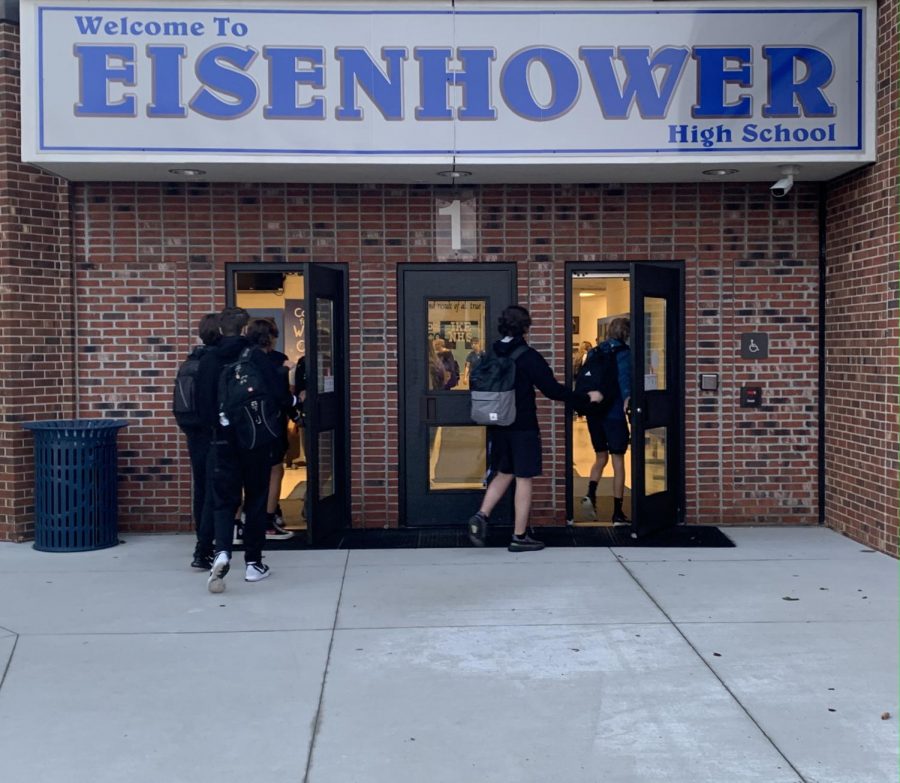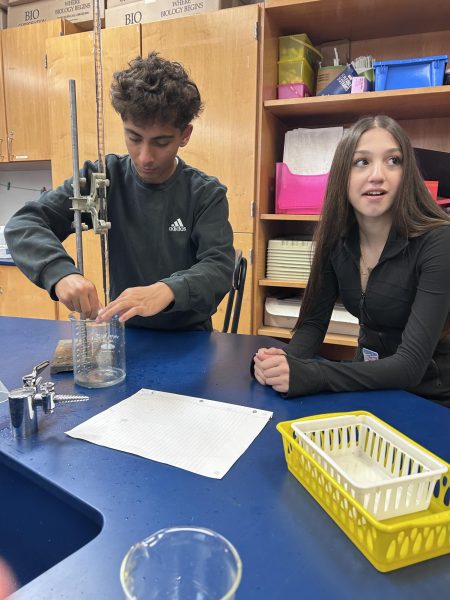Attendance policy updated
Rules and regulations promote timeliness among students
Walking into school, students arrive early to be in class on time. The updated rules and regulations promoted timeliness and clarified excused and unexcused absences. “We went from having 30 or 40 people come in late to school to 10, so it’s definitely made a huge difference,” associate principal Scott May said.
Sleeping in, sitting in traffic and skipping class to rest; some of these excuses don’t cut it anymore after the revamped attendance policy.
“It’s a radical change. The district policy hasn’t changed, but the rules and regulations did and how it’s enforced,” associate principal Scott May said. “It’s something that should have been done or that has needed to be done for a while. The attendance policy has been pretty relaxed in the district and they wanted to make it consistent across the buildings.”
Attendance rules and regulations address the number of unexcused absences per semester and introduces the magic number 10: the maximum number of unexcused absences before a student is placed on credit review. Additionally, tardies are now factored into unexcused absences after three occur in a class; and not every absence counts as excused.
Absences fall into two categories: excused and unexcused. Excused reasons include: student illness, doctor-ordered bed rest, pre-arranged court appearances, death in the immediate family, pre-arranged and approved family vacations and medical appointments.
“Attendance is what it really boils down to. Attendance is the key to the success of students. If they’re here, they’re more likely to be successful than if they aren’t here,” May said.
If a student becomes close to 10 absences, they will receive a letter stating credit may be lost. The appeal process begins with a mandatory meeting with a student’s associate principal once they are close to reaching 10 absences. Students have two choices: ignore the letter and information and risk losing credit or continue with the appeal process.
Once a student goes over and hits 11 absences, they lose credit. It is up to them to attend after-school sessions with teachers or Saturday school to make up time, which is recorded on a sheet. At the end of the semester, they submit the form and the student’s administrator reviews it to determine if they earn credit back or not.
“I think that it’s a little strict, but I understand why [the district] changed it. I think more people will show up and not skip,” sophomore Ella Skope said. “A con would be for people who have after school activities that sometimes go into school hours. I am on a cheer team and I’m going to be handling it by making sure if it’s not necessary to leave early, I won’t; but if I have to, try to limit the amount of times I leave early.”
As of October, five students have gone on credit review and many others have been warned they are close, according to May. Sessions to make up credit currently take place every other Saturday and will be held more frequently further into the year.
“The policy is not going to change. What may change over the course of the year is how we help support students with the policy. What may change are the opportunities that we provide students to make up the time that they might need; us finding ways to help support students with making up that time that’s going to change. We hope to have as many opportunities as possible to support students,” principal Jared McEvoy said
Despite it being cold and flu season, some students come to school to avoid missing days; however, the attendance policy allows students to be excused absent for sickness with a doctor’s note.
“Do not come to school if you’re sick. The reality is this new attendance policy [allows] 10 days of absences that a student could accrue before really anything needs to be done about it. Ten days in one semester is a lot and that 10 days doesn’t count if you’re quarantined,” McEvoy said. “I would say, if you’re a student and you’re missing 10 or more days in a semester, there’s bigger issues there. If you are an average student with an average number of absences, you shouldn’t have to worry about missing a day because you’re sick; you should stay home. If you are not well and exhibiting any symptoms, you should stay home, rest, feel better and then come back to school.
“There’s a lot of extra anxiety about illness right now, whether it’s COVID-19 related or not, it’s just one of the things that we’re all dealing with. So if a student is not feeling well, they should not report to school.”
The updated attendance regulations are not meant to encourage students to come to school when they’re sick. The update on tardiness and early dismissals counting as absences is to cut down on students arriving late to school and leaving early, according to May. Now, every third tardy counts as one absence; and early dismissals, no matter how long there are for, count as an absence.
“A good thing about it is that a lot of kids have unexcused absences or if their parents call them in a lot, they will be held more accountable for their work and they are kind of forced to actually be here,” senior Christina Elezovic said.
Reasons for early dismissals are more strict as well, including: if a doctor’s note is not brought in or the reason doesn’t match the parent’s previously called in excused reason.
“I like the attendance policy, I’ve always liked it; especially when they are going to enforce it now,” physical education teacher Lisa Doherty said. “The hard part I have, being a mom, being a coach, being a teacher, is the early dismissal policy that they are implementing as being [absences], because there are some kids who do need to leave early for various reasons and they don’t get that opportunity now because it could affect their attendance; so that part to me is a little tough.”
If students or parents have questions or need clarification regarding the updated attendance policy, they can look at the student handbook or direct any questions to associate principal Scott May in the front office.
Your donation will support the student journalists of Eisenhower High School. Your contribution will allow us to purchase equipment and cover our annual website hosting costs.





